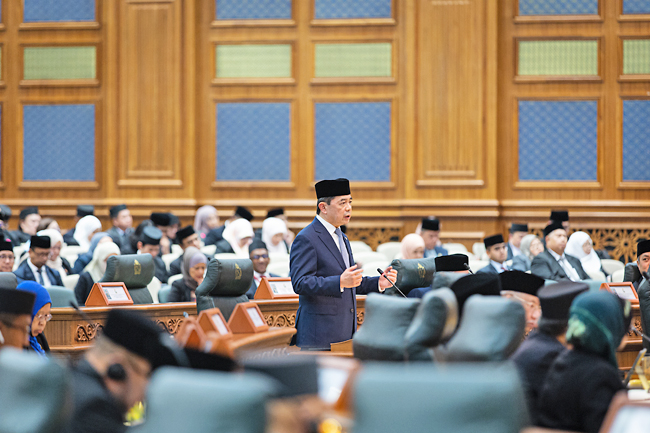The Government of His Majesty Sultan Haji Hassanal Bolkiah Mu’izzaddin Waddaulah ibni Al-Marhum Sultan Haji Omar ‘Ali Saifuddien Sa’adul Khairi Waddien, Sultan and Yang Di-Pertuan of Brunei Darussalam prioritises efforts to expand international trading and the tourism sector that could stimulate local businesses, open employment opportunities and directly raise the well-being of the economy of the overall community and citizens in support of diversifying the economy and strengthening the non-oil and gas sector.
Minister at the Prime Minister’s Office and Minister of Finance and Economy II Yang Berhormat Dato Seri Setia Dr Awang Haji Mohd Amin Liew bin Abdullah shared this at the third day of the 20th session of the Legislative Council meeting on Thursday.
He said towards this, allocations have been provided which include a project cost of BND36.4 million to implement 10 projects under the 12th National Development Plan (RKN12) to improvise tourism products including strengthening the basic infrastructure and public amenities at tourist attraction spots.
The minister said to ensure the international airport’s infrastructure is modern and efficient, the government will allocate a project cost of BND60 million under RKN12 to implement two projects, which are to repair the Brunei International Airport (BIA) runway and upgrade the aerodrome infrastructure and facilities at BIA.
He added that as an addition to these digital transformation plan initiatives, the government has made allocations to expand the network infrastructure and innovative solution to enable the people to communicate, access online services and take part in digital economic activities at global and regional levels.
This includes providing of capacity building programmes to stimulate a digital literate community and knowledge empowerment in information technology (IT) to adapt to the change brought on the digital landscape, the minister said.


Various agencies including statutory bodies and government-link companies (GLCs) have implemented several programmes to support this. These include the Upskilling Training Programme conducted by the Authority for Info-communications Technology Industry of Brunei Darussalam (AITI) specifically for youth jobseekers and local workforce to ensure they are industry-ready competency based on the industry’s demand, he said. The Productivity and Efficiency Joint-Funding for Digital Adoption (PENJANA) Scheme is offered by AITI to businesses to take digital solutions to upgrade business and productivity and reduce operation costs. Meanwhile, the Cyber Security Order 2023 has been enacted to strengthen the basic role as the national cybersecurity agency and it also brings forward the nation’s commitment to protect the Brunei Darussalam Critical Information Infrastructure, he added.
The minister added: “As one of the basis of digital economy, a flagship project under the Digital Economy Masterplan 2025 has been introduced, which is the National Digital Payments Network.
“A consortium made up of Baiduri Bank Berhad, Bank Islam Brunei Darussalam, Darussalam Assets Sdn Bhd and Perbadanan Tabung Amanah Islam Brunei (TAIB) have been set up to implement the Digital Payment Hub.
“The project is hoped to realise benefits such as stimulate innovation of the finance sector (FinTech), reduce transaction costs digitally, provide a more efficient business management and reduce financial fraud.”
The minister also shared on the National Welfare Scheme (SKN) launched in July 2020 where the system was awarded the Asian Technology Excellence Award 2023 for the enterprise software for the Brunei Darussalam government.
He said to establish an efficient public service, accessible and responsive to the citizens and subjects, allocations have been made under the RKN12 with a project cost of BND36.47 million to support digital transformation.
The GOV.BN 2.0 development, is a platform to keep government services under the one-stop service portal not only to facilitate the services delivery to the public but also save maintenance costs, the minister said.
The One MOHA System which among all to digitalise documents and applications including the new system for the National Emergency Response System to facilitate delivery of services to the public.
The Record Management System supports efforts in realising the government’s digitalisation through providing a standard platform in work management such as electronic document, record and correspondence including archive management.
The Integrated Statistical Data System will integrate statistics of data on economy, social and national to facilitate the collection, processing of analysts and main data delivery needed to prepare policies.
The National Business Service Platform is a platform for e-government services relevant to business processes in the country, which is hoped to ease the work-flow and continuity of the process involving inter-agency interaction.
Meanwhile, to ensure a more centralised information collection and co-users and improvise the Financial Management System and delivery of government services to the people, the government allocated BND10.8 million for the implementation of system transformation of Treasury Accounting and Financial Information System (TAFIS) 1.0 to TAFIS 2.0 that will be launched next month.
BND144.7 million has also been allocated to finance IT central procurement and software licences for all ministries and government departments and to support the digital transformation in the transportation and logistics sector, a total of BND15.7 million is allocated.
This allocation covers the smart transport system to provide real time information, cashless payment option and on-demand transport service to complete the country’s public transportation ecosystem.
It also covers the expenditure for the digitalising process of online services including digital licences, automated verifications and authorisation as well as, lifecycle and vehicle tracking history capability.
To support the positive changes in the education landscape particularly for schools in rural areas and to improve efficiency in the administration process, allocations under RKN12 has been made with a project cost of BND24.1 million.
This covers the implementation of two specific projects to upgrade the infrastructure of government school networks to ensure high speed and reliable connectivity for digital learning materials and sources and to implement the Universiti Islam Sultan Sharif Ali (UNISSA) Smart University and UNISSA Smart Library System.
The government will also continue its efforts to inculcate strong ties with international partners to upgrade access to new markets, investment opportunities and latest technology to help the local industry.
The minister called on local companies to grab opportunities from economic collaboration outcomes by partaking in regional and global network values and increase competitiveness in global market.
He said the government has rectified the Comprehensive and Progressive Agreement for Trans-Pacific Partnership (CPTPP) to New Zealand, as the depository country for CPTPP in May last year where the Ministry of Finance and Economy (MoFE) as the agency spearheading the discussion will disseminate benefits local entrepreneurs can take advantage as the agreement will open market access to 600 million citizens and overall total of gross domestic product (GDP) that gained around USD13.5 trillion.
The MoFE will conduct dissemination and meeting sessions with stakeholders, particularly the private sector, to upgrade knowledge on current trade agreements.
The government will continue investments for education programmes by upgrading education quality to encourage lifelong learning opportunities, the minister said.
He said to support a high quality education system, several initiatives have been implemented such as amendment to the compulsory Education Act Chapter 211, technology, engineering and arts as one of the core subject options in the component of STEAM (science, technology, engineering, arts and mathematics) and integration of religious studies into the General Education system.
The government will continue to collaborate with industry sectors in vocational initiatives to ensure a skilled workforce aligning with job market needs.
Hengyi Industries Sdn Bhd offered scholarships in engineering to 891 students, a joint collaboration between Zhejiang Hengyi Petrochemical Co Ltd and Lanzhou Petrochemical Polytechnic in China.
The minister called on youth to grab these opportunities to upgrade skills through various platforms by both the public and private sector and stakeholders.
A project costing BND472.3 million has been allocated under RKN12 to upgrade education facilities covering the implementation of 32 projects to build primary, secondary and religious school infrastructure as well as higher learning institutions including UNISSA Campus in Temburong District and a permanent campus for Politeknik Brunei in Kampong Madaras.
BND37.3 million in the form of scholarships through the Ministry of Education and Ministry of Religious Affairs have also been allocated to upgrade marketability and capacity building as well as student training skills by providing opportunities to pursue higher learning at world renowned institutions.
BND1.5 million has been allocated to conduct the Miftaahun Najaah Scheme – a scheme to ease the burden of underprivileged parents and guardians, while BND24 million will be provided under the Manpower Planning and Employment Council (MPEC) at the Prime Minister’s Office for the i-Ready programme, TVET Scheme, SkillsPlus, SPIN in Accountancy and trade skills.
BND61.8 million is also allocated to promote and encourage research and innovation in the field of science, technology and engineering, social science and arts and culture.
The building of Cultural and creative Industries Hub (CCI Hub) and Community Library is a new innovation to empower creative employees and strengthen the arts and culture infrastructure.
The Council for Research and Advancement in Technology and Science (CREATES) Research Fund will encourage the growth of science, technology and innovation activities as well as drive economic and social development. The BND2.3 million allocation for research cost implemented by public higher learning institutions will also continue to be allocated.
BND27.5 million will also be allocated under the specified focus project to cover expenses on programmes or projects to support the financial expenditure Year 2024/2025. – Lyna Mohamad




